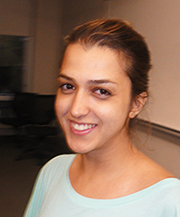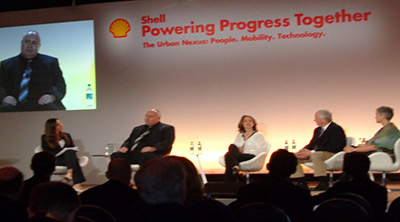
Nassim Khalili, an Environmental and Energy Management Masters student, was awarded a trip to Detroit, MI to participate in the April 2015 Shell Powering Progress Together program. GW’s environmental information program “Planet Forward” sponsored the trip for Nassim. All of her expenses were paid and logistics taken care of by Planet Froward, and she got the chance to meet the Planet Forward team and network with students from other consortium schools and businesses represented at the event.
In several international cities, the Shell Powering Progress Together program brings together some of the world’s principal intellectuals and thinkers from industry, business, academia, government and NGOs to discuss challenges of energy in the future. In the past, these events have been held in the Netherlands (2012), Germany, the Philippines, Turkey, and the USA. The objective of the program is to address several dilemmas ranging from how the world’s vital resources, including energy, water and food, will experience growing pressure in future decades to what the role of the resilience thinker is in addressing these future resource stresses.

On April 9, 2015, Shell hosted such a Powering Progress Together forum in Detroit, MI at the COBO Center. The main focus areas were the intimate connection between people, mobility, and technology. The panelists addressed key challenges faced by Detroit and other world cities in transition. Three principal aspects were considered:
1. Defining the role of the new urban citizen;
2. The role of technology as the facilitator in a new urban world;
3. Re-thinking mobility in future cities.
Panelists considered how to generate tangible actions to address such issues, typically in the form of city-based initiatives run by young professionals. Speakers and panelists at the event shared their expertise, experiences and views in an innovative environment in order to generate new ideas and debate around potential solutions.
The opening dialogue was conducted by two leaders from government and business, Michael Duggan (Mayor of Detroit) and Marvin Odum (President of the Shell Oil Company). They discussed the opportunities and challenges of rapid urbanization from their perspectives and outlined what each sector can deliver. They also offered insights into how business and civic leaders can work together.

To define the role of the new urban citizen, Susan Crawford (Co-Director, Berkman center for Internet & Society, Harvard Law School), Joel Makeower (Chairman and Editor of GreenBiz Group Inc.), Sacha Haselmayer (CEO of Citymart), and Neil Kleiman (Director of NYU Wagner Innovation Labs) gave speeches on the shifting urban experiences and innovations that make cities more responsive to addressing citizens’ needs. They also declared that to help cities meet requirements of swelling populations, governments must employ smart urban planning.
On the subject of technology, as the enabler to a new urban world, Aneesha Chopra (Co-founder of Hunch Analytics), Marc Gunther (Editor-at-large of Guardian Sustainable Business US), Gordon Feller (Director of Cisco), and Suparno Banerjee (Vice President, Hewlett-Packard Company) outlined how technology connects people and cities and that it is the catalyst for bringing smarter urban development to life. It was also mentioned that innovations stemming from technology will mitigate the stresses caused by rapid urbanization, offering new options for mobility, redesigned energy systems and ways to make cities smarter and more efficient while improving quality of life.
The third topic, concerning re-thinking mobility in an urban world was addressed by Robin Chase (Co-founder of Zipcar), Amanda Eaken (Deputy Director of Natural Resources Defense Council), Wolfgang Warnecke (Chief Scientist, Shell), and Dr. J. Gary Smyth (Executive Director of General Motors Company). Since cities are in a constant cycle of assessing and modernizing transportation infrastructure to accommodate population growth, the session looked at the new urban cities and the innovative ways of moving people and goods. Afterwards, Frank Sesno (Director of School of Media and Public Affairs, The George Washington University) and Michael Duggan (Mayor of Detroit) revisited the proposed solutions, how they were analyzed, and how they can be advanced in Detroit and other cities of the world.


